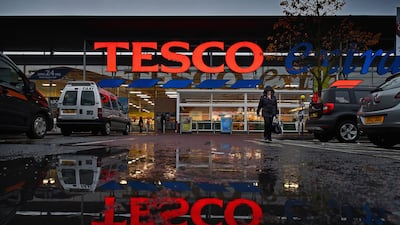Latest: Tesco trims profit expectations amid discounter battle
The profits of Tesco and other supermarkets grew rapidly during the pandemic, as restrictions to stem the spread of Covid-19 prevented people from going out to eat.
But analysts say those retailers are now facing significant economic headwinds due to soaring inflation and increased competition as the crisis in the cost of living continues to bite.
Tesco, the UK’s largest supermarket chain, with a 26.9 per cent market share, will this week report its first-half results.
Shares in the FTSE 100 company are down by 10 per cent this year, all of which has come in the past month, as confidence has fallen in global stock and the UK’s economic prospects, said Russ Mould, of AJ Bell, a low-cost platform for DIY investors.
“In terms of company specific issues, shareholders may be fretting a little bit about ongoing competition in the grocery business," he said.
"According to Kantar Worldpanel, Tesco’s market share is still a market leading 26.9 per cent, but that’s down from 27.3 per cent a year ago as the discounters Aldi and Lidl have continued to relentlessly gobble up market share.
“That price competition is coming at an awkward time because of the weaker pound, rising utility bills and higher pay for staff means Tesco would probably quite like to compensate for those costs with higher prices, or at least stable ones, while still providing value for its customers.
“Now, this is a difficult balancing act to achieve and we have to all eat, drink and keep our houses clean.
"At the same time, we may buy less or at least trade down through brands if times get tough and prices go too far for us.”
Ying Wai Cheung, an analyst with Euromonitor International, expects sales in the first half to show modest growth towards the lower single digits.
“As their first half results covers most if not all of the period that was marked by double-digit inflation of many [food] products, the growth is driven by the increase in prices rather than consumer demand,” Mr Ying said.
But performance in the second quarter specifically is expected to be more disappointing.
Mr Ying said Tesco fared well during the pandemic as people stayed at home and did not go out to eat or drink.
“As such, their online sales came to nearly £6 billion [$6.7bn] in their last fiscal year, which is 66 per cent higher than two-year prior, while handling 1.22m orders per week," he said.
“However, this was a trend amongst all of the biggest grocers in the UK. We are seeing a sector-wide correction in online sales amongst grocers.
"The pandemic and its lockdown led to an artificial demand for online groceries, and to what point that will be correcting itself in the second quarter will be interesting to take a note of as it will likely be aggravated in the end of 2022 and 2023.”
Aldi. which has promised it will have the "lowest grocery prices in the UK" as it seeks to support consumers facing surging energy and fuel bills, has had significant growth in customer numbers as shoppers have sought to rein in costs.
That helped the UK arm of the German chain overtake Morrisons as the UK's fourth-largest supermarket.
The retailer had sales increase by 18.7 per cent over the 12 weeks to September 4, compared with the same period last year.
It also said it added 1.5 million extra customers compared with last year, as people seek its discounts.
The chain saw its profits slump by more than 80 per cent last year after the company witnessed rising costs and invested in pricing. But it has vowed to continue to give priority to lower prices over short-term profit.
"Preserving our price discount and rewarding our people will always be more important to us than short-term profit," said Giles Hurley, chief executive of Aldi UK and Ireland.
"Being privately owned means we can keep our promises even when times are tough."
Losing customers to Aldi and other discount supermarkets will be Tesco’s “main challenge” going forward, Mr Ying said.
“Customers are downtrading for discounters in great numbers,” he said.
“It comes to no surprise that discounters do well in times of economic recession.
“Basket sizes will likely become smaller and this could continue into 2023, with negative consequences for grocers like Tesco.
"The devaluation of the pound could further affect the inflationary pressures we have seen.”


